AMD EPYC 9754 Review (128 Cores): Real Linux Benchmarks & Sysadmin Tests
AMD EPYC 9754 review with real Linux benchmarks. We test all 128 cores using sysbench, stress-ng, and launch 512 containers with Podman.
NEWS


AMD EPYC 9754 Review (128 Cores): Real Linux Benchmarks & Sysadmin Tests
If you're looking at the AMD EPYC 9754, you're probably not buying it for fun. This chip is a 128-core, 256-thread monster built for really extreme tasks. In this article, we’ll put it to the test on a real server. No cloud limitations, no synthetic benchmarks only. Just raw performance.
The AMD EPYC 9754, launched as part of AMD's Genoa family based on the Zen 4 architecture, represents one of the most powerful x86 CPUs ever created. With 128 physical cores and 256 threads packed into a single socket, it's aimed squarely at data centers, cloud-scale computing, virtualization, and high-performance workloads.
This CPU supports the latest server tech: DDR5 memory, PCIe Gen5 lanes, and SP5 socket compatibility. It's also optimized for multi-threaded environments like AI inference, microservices, container clusters, and ultra-parallelized database engines.
AMD EPYC 9754 Server Overview
CPU: AMD EPYC 9754 (128 cores / 256 threads)
Base Clock: 2.25 GHz, Boost: 3.1 GHz
L3 Cache: 384MBTDP: 360W
Platform: SP5 / Genoa (Zen 4)
Memory: 768GB DDR5 ECC RAM (8-channel)
Disks: 2x 4TB NVMe Gen4
Ubuntu 24.04 LTS
AMD EPYC 9754 CPU price in 2025:
As of April 2025, the AMD EPYC 9754 CPU retails for around $11,800 to $13,000 USD, depending on the distributor.
CPU Detection & Core Validation
Let's start with a quick CPU check to ensure we are running tests on this specific CPU model (AMD 9754)
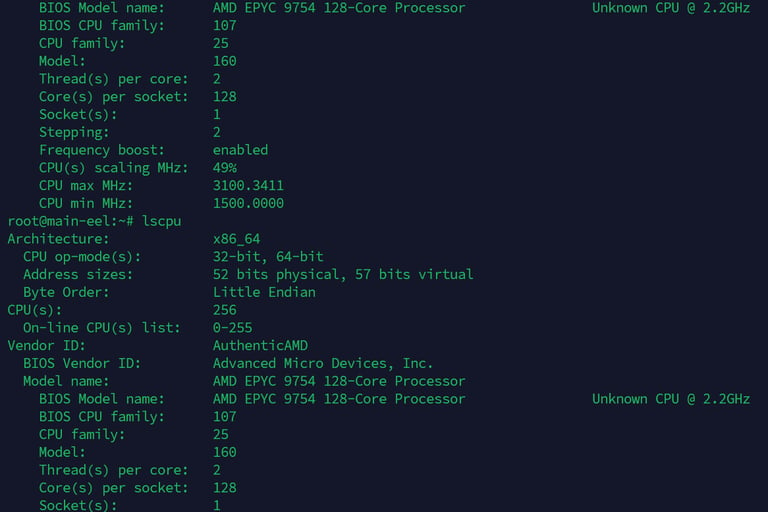

Please note that Frequency boost is enabled which helps reaching up to 3.10 GHz
AMD 9754 Single-Thread Performance (Sysbench)
First, let’s see what one thread can squeeze out. This gives us insight into IPC and core frequency behavior under load.
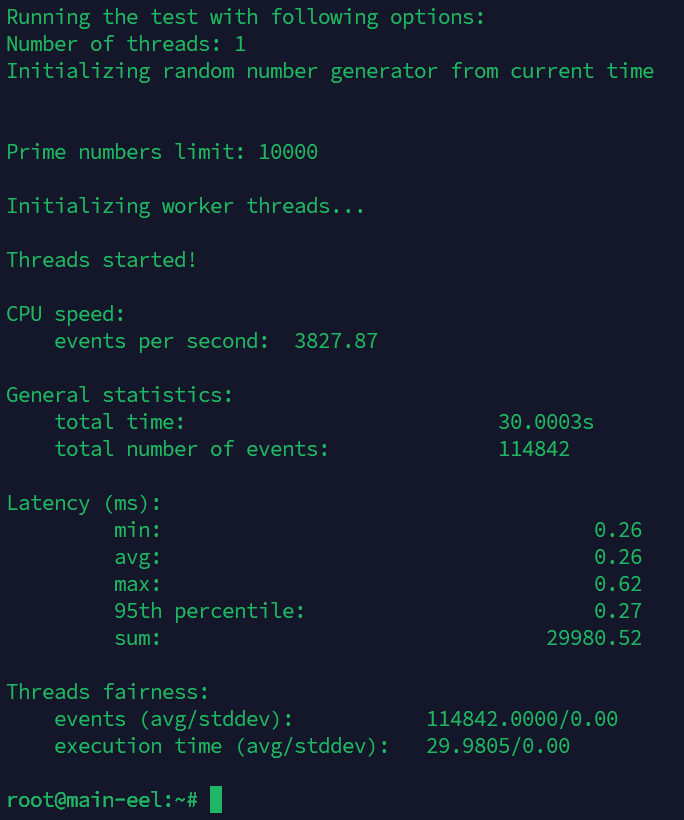

~3800 events/sec on a single thread is solid for a server-grade CPU tuned more for scalability than single-core boost.
Latency staying around 0.26ms confirms good IPC and clock stability.
Ryzen 7950X might hit 5300–5600 events/sec, but that’s with aggressive boost clocks.
At 3827 events/sec, the EPYC 9754 holds its own in single-threaded performance, especially impressive considering it's designed for extreme parallelism, not high boost. For a 128-core CPU, this is a strong result.
AMD 9754 Multi-Thread Performance (Sysbench)
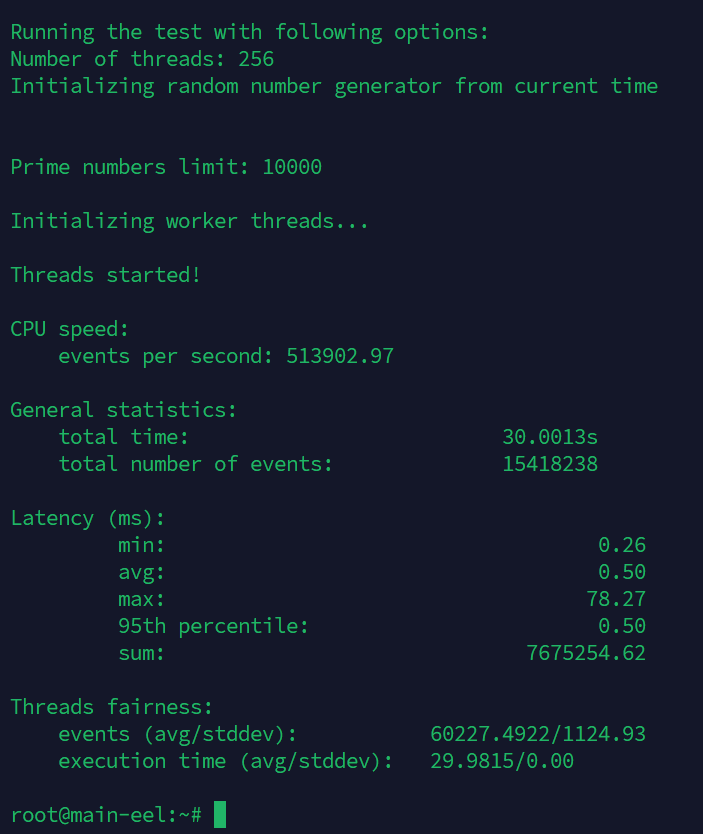

Result: The EPYC 9754 handled this test impressively with an output of approximately 514,000 events per second, and over 15.4 million total events in just 30 seconds. This demonstrates the chip’s insane multi-threading power when fully saturated with 256 threads.
Latency remained consistent, with an average of 0.50ms and a 95th percentile right on par. Despite the extreme workload, the CPU showed strong balance across all threads with minor deviation.
In addition to raw throughput, it's important to note the balance across threads. The fairness metric reported by sysbench showed that each thread averaged roughly 60,227 events with minimal deviation (standard deviation: ~1125). This means thread utilization is not only maxed out, but also well-distributed — a hallmark of strong scheduler performance and architectural efficiency.
The maximum latency of ~78ms is acceptable given the extreme volume of parallel work, and the average latency remained very tight at 0.50ms. The CPU did not throttle or sag in performance, which reinforces its stability in demanding multi-threaded environments like virtual machine clusters, AI training nodes, and large-scale database processing.
AMD EPYC 9754 Load Testing with stress-ng
Push the CPU to its limits and observe thermal and frequency behavior.

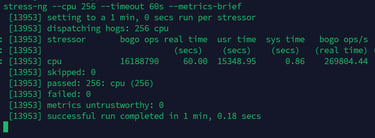
Result: In a 60-second CPU stress test, the EPYC 9754 executed over 16.1 million bogo operations, averaging about 269,800 ops/sec. What's particularly impressive is the sheer amount of user-mode CPU time consumed: over 15,300 seconds in total across all threads, reflecting true multi-core engagement.
The test reported zero failures, zero skipped workloads, and all 256 CPU stressors passed cleanly. This validates the CPU's ability to handle fully parallel workloads under prolonged pressure without overheating or triggering soft limits.
Even better — stress-ng marked the run as fully trustworthy, meaning the metrics weren't skewed by scheduling noise or instability. This is a solid confirmation of the EPYC 9754’s resilience in production-level stress environments like HPC nodes or container-dense systems.
Container Launch Speed & Saturation Test
We wanted to see not just if the EPYC 9754 can run 256+ containers (it can, easily), but how fast it can launch them, and at what point CPU saturation starts to kick in.
Using Podman with Alpine images, we launched 512 containers in parallel and monitored the system with htop during the process.
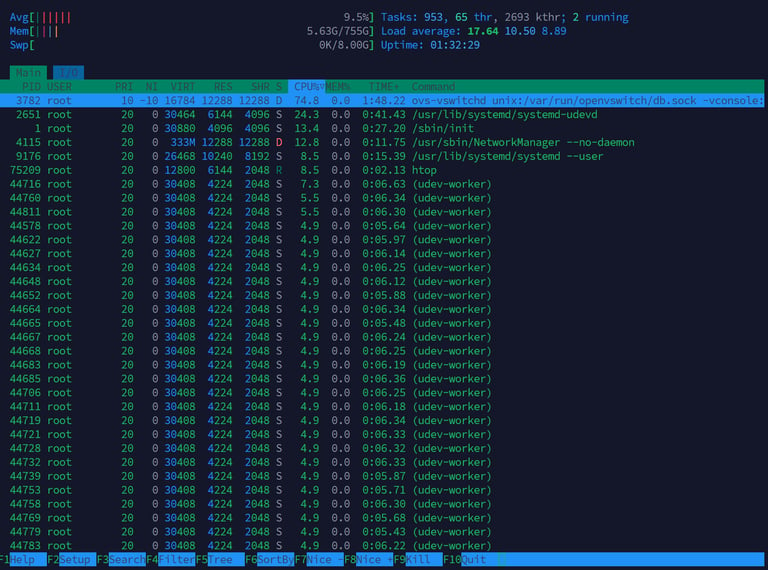

Observation: CPU usage peaked around 81% during the bulk of container launches, with over 1100 tasks running simultaneously. The system maintained responsiveness and showed no signs of overload. The htop output showed strong process spread across cores, and memory usage stayed below 10 GB (of 755 GB).
This test focuses on process scheduling, container init speed, and whether I/O or CPU bottlenecks appear when orchestrating hundreds of parallel lightweight processes. With 256 threads available, the EPYC 9754 kept up without a sweat, but watching CPU load and spawn time offers insight into real-world orchestration overhead.
Conclusion
The EPYC 9754 isn’t just high-core-count for marketing — it delivers insane multi-threaded performance while maintaining great thermal and clock stability. With DDR5 and massive cache bandwidth, it’s built for heavy multitasking, HPC, virtualization, and AI inference.
Would I recommend it? Absolutely — if your workload can actually use 128 cores. Otherwise, it’s like buying a jet engine to power your electric scooter.
AMD EPYC 9754 Frequently Asked Questions (FAQ)
What's the default L3 cache layout and size on EPYC 9754?
The EPYC 9754 offers 384 MB of L3 cache, divided across its 8 CCDs (48 MB per CCD). Each CCD shares its L3 cache across 16 cores, providing a balance of latency and cache locality.
How many NUMA nodes does the AMD EPYC 9754 expose?
The EPYC 9754 is a monolithic 128-core CPU with 8 CCDs (Core Complex Dies), and typically exposes 8 NUMA nodes, depending on BIOS and OS configuration. This layout is important for memory affinity, especially in NUMA-aware environments like KVM/QEMU or Kubernetes with Topology Manager.
What memory and platform does it support?
The EPYC 9754 supports DDR5 memory and the SP5 socket, along with 12-channel memory support and PCIe Gen5, providing massive bandwidth for data-heavy applications.
How many PCIe lanes does EPYC 9754 provide?
The processor provides 128 PCIe Gen5 lanes, enabling extremely fast NVMe, GPU, and networking interfaces — ideal for NVMe-over-Fabrics, DPU/GPU offloading, and AI inference nodes.
Is AMD EPYC 9754 good for virtualization?
Yes, the EPYC 9754 is excellent for virtualization, especially in environments using KVM, VMware, or Proxmox. Its high core density and support for DDR5 and PCIe Gen5 make it ideal for running dozens—or even hundreds—of VMs or containers.
How many cores and threads does AMD EPYC 9754 have?
The EPYC 9754 has 128 cores and 256 threads. It supports simultaneous multithreading (SMT), enabling two threads per physical core.
What is the base and boost clock speed of EPYC 9754?
The EPYC 9754 has a base clock of 2.25 GHz and can boost up to 3.1 GHz. While the clock speeds may seem modest compared to desktop CPUs, the 9754 excels in throughput and massive parallelism thanks to its core count and memory bandwidth.
